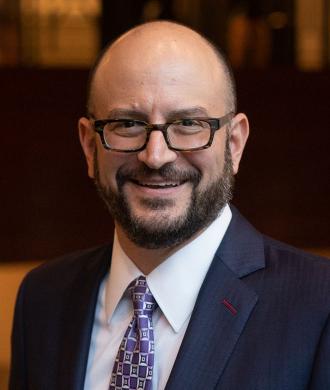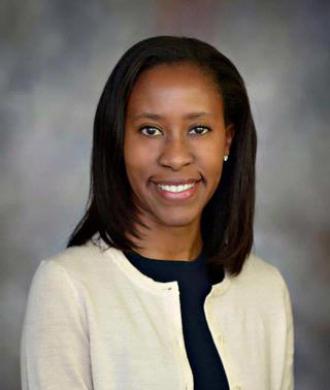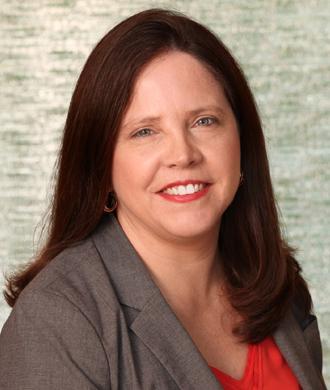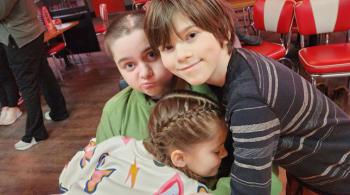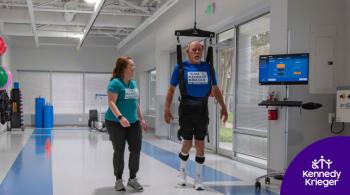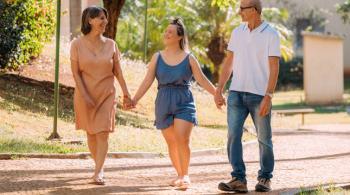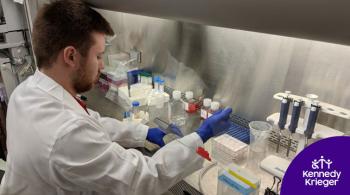Unraveling the Mysteries of Rare Childhood Diseases
This month on Your Child's Brain, the importance of how research plays a role in rare diseases is discussed.
Guests include:
- Dr. Erika Augustine, Associate Chief Science Officer and Director of the Clinical Trials Unit
- Dr. Anne Comi, Director, Hunter Nelson Sturge-Weber Center
Learn More About Our Featured Speakers
Learn More About Our Featured Speakers
View Episode Transcription
Brad Schlaggar (BS): Welcome to Your Child's Brain, a podcast series produced by Kennedy Krieger Institute with assistance from WYPR. I'm Dr. Brad Schlaggar, pediatric neurologist and President and CEO of Kennedy Krieger Institute. Today, we will be discussing a couple of related topics, rare neurological diseases in children and the importance of clinical trials in pediatric medicine. I'm joined today by Drs. Erika Augustine and Anne Comi. Both are experts in pediatric onset rare diseases of the nervous system and in clinical trials for children. Dr. Augustine, a pediatric neurologist, is the Associate Chief Science Officer and Director of the Clinical Trials Unit at Kennedy Krieger Institute and she is an associate professor of neurology at the Johns Hopkins School of Medicine. Dr. Comi, also a pediatric neurologist, is the Director of the Hunter Nelson Sturge-Weber Center at Kennedy Krieger Institute and is a professor of neurology at the Johns Hopkins University School of Medicine. Welcome Erika and Anne. Erika, let's start, what exactly is a clinical trial and how do they differ from other research studies and what's the objective?
Erika Augustine (EA): Well, thanks Brad for inviting me to join you to talk today. There's nothing I love more than talking about clinical trials and really thinking about how we move forward new treatments for our patient communities. I think the motivations for research and trials are really important. If it's okay with you, I'd take a step back. We're all clinicians and I imagine that for each one of us, the reason that we went into medicine was to help people. When I'm with a patient, my goal is to help that one person, to work with them to alleviate symptoms or improve symptoms. In clinical research, my goals are the same, except I can do that with broad groups of people. In clinical research, the goal is to create knowledge that can help many people and in clinical trials, the goal is to test new treatments or to create new ways to provide care for, again, many groups of people. Trials are just one kind of research where the goal is to test and to develop new treatments.
BS: Well, those are really important objectives that we all share, and we are in the pediatric medicine space, the three of us. We are quite aware of the discrepancy between the amount of clinical trial work that's done in pediatrics versus in adult medicine. Maybe we should talk about that a little bit, Erika, what is the discrepancy? How different is the volume of clinical trial work in pediatrics versus adult medicine, and why does that matter?
EA: I wish I could say that children had those same opportunities to have new treatments developed or that new therapies came about for children at the same pace as adults. But that's not the case. Maybe 10, 15 percent of ongoing trials involve children. The general path is adults first, then children. I think when we look back at the pandemic and the development of vaccines, we can see exactly that. It was adults first and then children. We tend to work our way back. We really start with the oldest age group in children once we get to children and then gradually go younger and younger when it comes to clinical trials. We know that even today there are ongoing trials for children and groups of children or age groups where vaccines haven't been developed yet, because we started with that paradigm of adults first and working back. Sometimes we don't work back. There's actually a legislation that has been developed to try to stimulate more interest in and more development that focuses on pediatric clinical trials and that's had some success. But as we all see in our day-to-day practice, the three of us, many of the medications that we prescribe and for many other people who care for children, most of what they prescribe is what we call off-label. The label for any one drug is really the set of instructions and the summary of the evidence or the knowledge that was developed about that drug that helps inform a clinician on how to use that drug. That information in the label is all based on the clinical trials. If the clinical trials didn't involve children or the clinical trials didn't involve children with a specific condition, those instructions may not address the questions that you have as a clinician when you're faced with a patient. Again, you're going back to that idea of trying to help treat and alleviate symptoms. You might not have all the information that you want about dose or about side effects, or about how much it actually helps. There's a lot of work that we need to do.
BS: Agreed. Completely agreed. Anne, let's talk about rare disease now. What is the definition of a rare disease? How do you make the diagnosis? What are some of the challenges that patients living with those rare diseases face?
Anne Comi (AC): Thanks Brad. A rare disease is a condition that affects fewer than 200,000 people in the United States. It's really important to recognize these conditions because it's more difficult for these families and patients to get an accurate diagnosis and that's because fewer clinicians have actually cared for these patients in large numbers and understand how best to make the diagnosis and what the optimal treatments are. Since that's the case, it's important for these patients to have access to experts in their conditions. I have expertise in the diagnosis and care of Sturge-Weber syndrome. It's important for patients and families to have access to the people who really understand the disorder. In addition, it's more difficult for us to obtain grant funding for many of these rare diseases in order to be able to improve understanding, carry out clinical trials, and advance the care of rare diseases. It's really important that we get the message out that altogether, patients with rare diseases account for a very large number of patients and are very important to moving medication forward in pediatric neurology. It's just that for each individual rare disease, there's not very many of those patients and those represent special challenges.
BS: Yeah, that's a point to really underscore that individual rare diseases are themselves rare. But altogether, it's not uncommon for somebody to have a rare disease. Anne, maybe talk a bit more about, you mentioned Sturge-Weber, maybe talk a little bit more about Sturge-Weber and what kinds of problems individuals with Sturge-Weber face. Then how clinical trials that you've been involved with have been beneficial for the patients that you take care of.
AC: Sturge-Weber syndrome, and related disorders that these patients that I see, they have abnormal blood vessels in the brain, the skin, and the eye. These cause a whole host of issues for these patients. Many of these patients with Sturge-Weber syndrome had seizures from a very young age. They're at risk for strokes and stroke-like episodes. Over time, they can develop neurologic issues like cognitive impairments, weakness, motor problems, and other learning issues. Clinical trials are really important for over time, moving the treatments forward, advancing treatment and care of these patients, and increasing our understanding of what causes the rare disease so that we can develop new targets and new treatments in future.
BS: Erika, let's talk a bit about what some of the challenges are in conducting a clinical trial investigation. The kinds of trials that Anne was just referencing for rare diseases. How do you address getting participants the issues around consent, funding? It's a rare disease. People may live far away from where that clinical trial is being carried out. Can you talk about some of those issues?
AC: Clinical trial logistics or are not straightforward. There is quite a lot that goes into the operations of clinical trials. I think one of the challenges for rare diseases, which as we talked about by definition, not a lot of people have any one rare disease. It still takes the same amount of resources and effort to launch a trial for perhaps 30 people as it does for 500 or even 1,000. It's still as a monumental effort to get that off the ground. Sometimes the funding is a challenge because it can be quite costly to develop and to execute clinical trials that are focused on rare disease populations and having the interests, the idea is to test the interests from either academics or from pharmaceutical companies to develop trials that can certainly be a hurdle. Then as you mentioned, being able to actually find the people who are eligible for the study who are vaguely in proximity or near a center that's conducting the trial, all can be major barriers increasingly as some of what we study in terms of new possible therapies for rare disease are complex therapies and they require specialized knowledge to track symptoms, are specialized knowledge to administer the treatment in the first place. There are more and more trials where people actually move or relocate for a period of time in order to be able to access the trial. It's great that the trials are happening, but we need to find ways to really improve access in a regional manner to make research participation more peaceful, and early diagnosis is another challenge along those lines.
BS: If you were speaking to a parent of a child that has a rare disease where there's a clinical trial available. What are some of the reasons why you might explain or discuss with parents about the reasons to choose to participate? Or any individual with a diagnosis that is available for a clinical trial. What's the argument for participating?
EA: In rare diseases, we really for many conditions can manage symptoms somewhat but effective treatments are often lacking. Most rare diseases we talked about that label, that FDA label, or the Food and Drug Administration label that goes on a drug. Most rare disease conditions don't have an approved therapy. The clinical trials are really important to be able to move forward a path to possible treatment. Trials aren't treatment, trials aren't care directly. It's really a process for testing whether or not an idea, a possible intervention could be a treatment. That trial is the way that we find out about that. For some families, they are highly motivated to participate in trials because of the lack of therapy and because of that possibility that what's being studied might be effective and that early access opportunity. Some families tell me that they're motivated to participate in trials, knowing that what's being studied might not work, but they're highly motivated to contribute to knowledge about their child's disease, to really try to make sure that the trials are successful in enrollment that there can be continued interest in developing new treatments and to really contribute to their community. There are so many different motivations for trial participation. I think those kinds of reasons and motivations are really important to discuss with families and for families to discuss with researchers as well.
BS: Anne, Erika is making the point about the trials are really testing an idea, a treatment concept. Let's just talk a little bit about how potential treatments are developed to be eventually tested in trials. How does the treatment come to be testable in a trial? Maybe speak to some of the work that you've done in that space.
AC: The journey towards new treatments for rare diseases and in particular begins actually with understanding that rare disease and what happens to those patients over time. That's called the natural history of the disorder. That's a really important starting place. We need to combine that oftentimes with lab research or what's called basic research to understand what causes those rare diseases. Perhaps the genetic mutation that causes them or other factors that are important to causing the symptoms that half these patients have. For example, several years ago, our team discovered the genetic cause for Sturge-Weber syndrome. That discovery pointed to some very important and novel new treatment strategies which subsequently we have begun to test in clinical trials and these patients.
BS: Maybe we can talk a little bit more about the specific experiences, successes with clinical trials that you've each carried out for rare diseases, Erika, we haven't really talked about Batten diseases that's your area of specific expertise. Maybe talk a little bit about that set of conditions and the work that you've been involved with to address it with clinical trials.
EA: Batten diseases, as you mentioned, they also go by another name, neuronal ceroid lipofuscinosis or NCL. You can see why we say Batten diseases. These are a group of conditions that are genetic diseases, that are progressive in nature, or what we call neurodegenerative. They mainly affect the nervous system and the people who have these conditions have a host of symptoms that may include blindness, problems with movement, problems with thinking or dementia, as well as epilepsy. For some of the NCLs, these symptoms result in a shorten lifespan also, these are very serious conditions. Across the group, like I was saying about most rare diseases, we don't have effective treatments for most of the forms of Batten disease. There's a lot of interests and a lot of passion in trying to bring forward new treatment options that can be effective and that can slow the progression of these diseases. I think what we see with Batten diseases is true for many rare diseases now, where we finally understand the cause of the conditions and we understand the genetics of these diseases. That gives us an opportunity to create paths to treatments that makes sense, or what we call rational therapeutics based on how the disease occurs. What we also have seen is that once there is one success in terms of creating a treatment, it generates a lot of interests. Several years ago, once the understanding of one particular form of Batten disease was known, something called CLN2 disease, it was understood that there was an enzyme that was missing. If you could give that enzyme back into the nervous system and you might have that opportunity to improve the disease course. That's exactly what happened. That natural history concept really understanding how the condition unfolds and how it impacts people was really formative to the development and approval of that therapy. To really see that idea, the basic science work and how it was able to move through a clinical trial to approval, was incredibly exciting. Then we worked with others again around this specialized delivery of this particular therapy to think about standards of care. With other NCLs, there are again many other efforts that are similar to bring forward new treatments. Some of the work that's ongoing that we've pursued and that is ongoing now has not only to do with natural history and how we best measure symptoms, but also how we tackle some of those challenges of geography and the ways that people are spaced out through unique kinds of partnerships. Maybe one central site with lots of satellite sites where people live or a study that I'm involved in now essentially has what might be thought of as a mega site, where there are three different institutions all working together to evaluate and conduct a trial for a single group of patients. There are a lot of innovations that we're trying to bring forward to make trials accessible and feasible.
BS: Thank you, Erika. Anne, I wonder if you wanted to comment a bit more about the work you've done in Sturge-Weber around cannabidiol and seizures. How that story unfolded, and what we've learned from those investigations.
AC: Thanks, Brad. We began clinical studies about 20 years ago. And over that period of time, developed biomarkers and what we call outcomes, ways to measure how the patient is doing and any improvements so that those can be used in drug trials. Several years ago, we began those studies and more recently, we carried out the first prospective oral drug trial with cannabidiol for medically refractory, very severe seizures in Sturge-Weber syndrome. Then we found actually the patients who are most severely involved, who had the fewest options, who had already failed multiple medications, responded the best, to the cannabidiol. Now we are able to utilize, administer cannabidiol for patients with Sturge-Weber syndrome and severe seizures. We are also moving forward with testing cannabidiol in for other aspects of Sturge-Weber syndrome. It's been really exciting process.
BC: It's a great success story. Our last question for this episode, for both of you. Let's start with Anne. What's on the horizon? What are you excited about, that's coming for pediatric clinical trials, especially in the setting of a rare disease?
AC: Thanks Brad. What's coming very soon I think, is the incorporating of genetic testing in the eligibility criteria and enrollment for patients on this spectrum of Sturge-Weber syndrome and related disorders, so that we can best target specific drug with a specific mechanism of action to the patients groups and subjects were most likely to respond. That process is evolving right now, linked to that, ultimately, for these rare genetic disorders like Sturge-Weber syndrome, we're very excited about the possibility down the road of gene therapy applied in those situations. Again, it's been really exciting times, very interesting and really important to keep moving these efforts forward.
BS: Erika.
EA: I think this is such an exciting time for care and for research for children. Some of the most exciting advances in medicine are happening in the context of neurology and neurodevelopmental conditions. We're really at a point where the foundational knowledge that we've been building for decades can now be paired with a library of tools and options of how we might actually target core symptoms, core causes of those diseases, to be able to move forward with their creation of new therapies, so we're in a whole new therapeutic era in our respective fields. I think will really see continued evolution in terms of how we diagnose certain conditions, how we care for people with these conditions, and how we create new paradigms around what it means to create treatments and all of that is just incredibly exciting.
BS: Well, thank you both, and as you all have heard, rare diseases are individually rare but collectively, they're relatively common. Understanding how to best treat these diseases to improve the lives of children living with them is paramount. Please check out our entire library of topics on your child's brain at WYPR.org/Studios, KennedyKrieger.org or wherever you get your podcast. You've been listening to your child's brain. Your child's brain is produced by Kennedy Krieger Institute with assistance from WYPR and producer Spencer Bryant. Please join us next time as we examined the mysteries of your child's brain.

